“Leaders are born, not made.” It’s something we hear often. But is it true? While some kids are natural-born leaders, leadership is a set of skills that can be learned and nurtured in everyone.
A common misconception about leadership skills is that harnessing them will enable an individual to command with fearful authority. True leadership, however, is not about power. It’s about inspiring and guiding a team to succeed and achieve their goals.
So, how to develop leadership skills in your kids? The answer lies in your hands. By providing opportunities and proper guidance, such as setting a good example as a parent, your kids can thrive as leaders, willing to listen to the opinions of others with compassion and take initiative to make changes for the better.
Why Fostering Leadership Skills in Kids Matters
Enhanced Academic Performance
Kids who take ownership of their learning tend to become more engaged. When they’re encouraged to lead, even in small ways like managing a group task or helping a peer, they start developing self-management and organizational skills that support academic success. They begin to see challenges as opportunities, not obstacles.
Social and Emotional Development
Being a leader isn’t just about what you do; it’s about how you relate to others. Kids who learn to listen well, resolve conflicts respectfully, and consider different perspectives become more emotionally aware and socially confident. These are the kinds of leadership skills that foster real, lasting connections.
Problem-Solving and Decision-Making
In our daily life, we are practically confronted with a variety of challenges. An inspiring leader with strong leadership skills can easily remain composed and calm under pressure to tackle these difficulties head-on. This mindset and skill significantly contribute to the overall success of an organization.
Building Self-Confidence and Self-Efficacy
Confidence doesn’t always come naturally, but it grows with experience. When kids see that their ideas matter and their actions make a difference, they start to believe in themselves. These are the moments that shape future leaders.
Future Readiness
We’re preparing kids not just for school, but for life. In a world that’s increasingly complex, leadership skills help young people navigate challenges, collaborate across differences, and step into responsibility—whether they’re applying to university, joining the workforce, or contributing to their communities.
Key Leadership Skills to Cultivate in Children
Communication
Being able to speak clearly and listen well is fundamental. Whether it’s explaining an idea or understanding a friend’s feelings, communication helps kids connect, collaborate, and lead with empathy.
Problem-Solving
All great leaders have one thing in common. While they do not know everything, they often ask the right questions. Guide your kids to look at the big picture and try to identify the core issue of a challenge. What’s exactly causing the problem? What are the ways to solve them? By asking questions and brainstorming solutions, your kids learn how to be assertive and make decisions to solve problems.
Teamwork and Collaboration
Modern corporations often value teamwork and a shared leadership structure over a traditional hierarchical management style. Learning how to respect each member’s responsibilities and make compromises can enable your kid to grow into a respectful leader who can thrive within a collaborative environment.
Responsibility and Accountability
Leadership also means following through. When children learn to take ownership of their tasks—whether it’s completing homework, helping with chores, or organizing a group activity—they begin to understand what it means to be dependable.
Empathy and Compassion
Active listening is an important skill. To gain respect and understanding from the others and the group for your leadership, a leader cannot neglect the needs of the others. Educating your children on the importance of fairness and compassion helps create an inclusive team environment and thoughtful culture.
Resilience and Adaptability
Things won’t always go as planned, and leaders need to be flexible. When children are encouraged to try again after setbacks or adjust their approach when things change, they learn to bounce back stronger.
Initiative and Proactivity
Leadership often means stepping forward without being asked. Kids can practice this by offering help, starting a small project, or suggesting a family activity—small steps that build big confidence.
Conflict Resolution
Disagreements are a part of life. Helping children learn to stay calm, listen to others, and find common ground teaches them that leadership also means building peace, not just getting their way.
Practical Strategies for Fostering Leadership at Home
Assigning Age-Appropriate Responsibilities
Giving your child small tasks like setting the table, feeding a pet, or planning a weekend activity teaches responsibility. Letting them take ownership—even if it’s not perfect—builds pride and purpose.
Encouraging Decision-Making
Offer your child choices. Whether it’s what to wear, what book to read, or what to do on a Sunday afternoon, involving them in decision-making helps them think critically and builds their confidence.
Creating Opportunities for Initiative
Ask questions like, “What do you think we should do today?” or “How would you solve this?” These invitations encourage children to step into leadership roles and develop their own voice.
Modeling Leadership Behavior
Children watch everything. When they see you admit a mistake, calmly resolve a problem, or help someone in need, they learn what real leadership looks like in everyday life.
Fostering Empathy
Talk about emotions—yours, theirs, and others’. Read books that explore different perspectives. Participate in community service or simple acts of kindness. These small experiences build a big heart.
Providing Constructive Feedback
Celebrate effort, not just results. Encourage your child to reflect: “What part did you enjoy most?” or “What might you try differently next time?” This helps them grow without fear of failure.
Fostering Leadership in Educational and Extracurricular Settings
Collaborative Learning Opportunities
Group projects, peer mentoring, and team-based challenges give students the chance to lead from different angles—sometimes by guiding others, and other times by lifting teammates up.
Student Voice and Choice
When students are invited to contribute to class decisions, choose topics, or express their opinions, they learn that their voice has value. This is practicing leadership skills in action.
Leadership Roles within School
Student council, buddy programs, and club leadership give children formal spaces to grow. Even helping to welcome a new student or organize an event can be a powerful confidence boost.
Extracurricular Activities
From sports and performing arts to science clubs and scouting, extracurriculars let kids practice leadership in fun, hands-on ways. Roles like team captain or project coordinator offer meaningful growth.
Encouraging Public Speaking and Presentation Skills
Whether it’s sharing a project in class or participating in a debate, giving kids opportunities to speak in front of others builds not just communication skills, but also courage for leadership.
Addressing Challenges and Supporting Growth
Fear of Failure
Remind them that mistakes are part of the process. Leadership isn’t about always getting it right—it’s about showing up, learning, and trying again.
Shyness or Introversion
Not all leaders are loud or outgoing. Some lead by example, through quiet confidence and thoughtful contributions. Create safe spaces for different leadership styles to shine.
Conflict and Disagreements
Help children see conflict as an opportunity to practice empathy and problem-solving. Guide them toward resolution rather than jumping in to fix it for them.
Over-Scheduling
Be mindful of burnout. While extracurriculars offer great leadership experiences, downtime is just as important for reflection, creativity, and rest.
Conclusion
Acquiring leadership skills not only benefits a child as an individual and their growth in various aspects, but it also empowers them to contribute to the success of a group or a team environment. This is crucial to the overall future development of a society. It is important to educate them to be intelligent, confident, and compassionate.
Are you ready for a world filled with the next generation of leaders? Start nurturing these skills in your kid today for a bright tomorrow.





